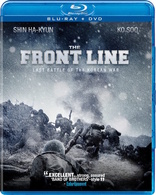The Front Line Blu-ray Movie
HomeThe Front Line Blu-ray Movie 
고지전 / Go-ji-jeon / Blu-ray + DVDWell Go USA | 2011 | 133 min | Not rated | May 08, 2012
Movie rating
7.4 | / 10 |
Blu-ray rating
| Users | 4.2 | |
| Reviewer | 4.0 | |
| Overall | 4.1 |
Overview
The Front Line (2011)
A veteran intelligence officer accepts the assignment and discovers mysterious and tragic occurrences surrounding a former comrade he had long thought dead. In the epic battle for survival that follows, the two men become locked in a deadly battle of wills. One will sacrifice his humanity for the sake of his 'brothers'; the other will discover compassion in the agonies of war. Ultimately, both will be forced to fight side-by-side, so their loved ones can enjoy freedom for just one more day.
Starring: Shin Ha-kyun, Go Soo, Ryu Seung-su, Kim Ok-bin, Ryu Seung-ryongDirector: Hun Jang (II)
| Foreign | Uncertain |
| Drama | Uncertain |
| War | Uncertain |
Specifications
Video
Video codec: MPEG-4 AVC
Video resolution: 1080p
Aspect ratio: 1.85:1
Original aspect ratio: 1.85:1
Audio
Korean: DTS-HD Master Audio 5.1
Korean: Dolby Digital 2.0
Subtitles
English
Discs
25GB Blu-ray Disc
Two-disc set (1 BD, 1 DVD)
DVD copy
Packaging
Slipcover in original pressing
Playback
Region free
Review
Rating summary
| Movie | 4.0 | |
| Video | 4.5 | |
| Audio | 5.0 | |
| Extras | 1.5 | |
| Overall | 4.0 |
The Front Line Blu-ray Movie Review
Band of Brothers, Korean style.
Reviewed by Jeffrey Kauffman April 28, 2012The Korean conflict is often termed “America’s forgotten war”, coming as it did between the epochal World War II and then the seemingly interminable Vietnam War. Of course later generations have fought battles in Iraq and Afghanistan which perhaps have only added to the under-remembering of Korea, but one of the most salient characteristics about the Korean War that is forgotten by many Americans is that it was in fact fought largely by Koreans, with “aid” from America and China. When pop culture finally took notice of the Korean War in such offerings as the film and television versions of M*A*S*H, it obviously wasn’t an overly realistic portrayal of a conflict that spanned years and wreaked devastating havoc across the Korean peninsula. The horrors of war, which M*A*S*H to its credit did try to at least glancingly portray, were often offset by the madcap antics of the denizens of the Mobile Army Surgical Hospital, which made the overall feel of the series bittersweet at best, and often strangely humorous for a show ostensibly about war. M*A*S*H did try to balance the horrors of war with the more playful aspects of some of the characters, but even with noble intentions the atmosphere of both the film and television series was often more concerned with the absurdity of war as a concept than with the actual horrors visited upon individuals, plus the focus was after all mostly on the Americans rather than the Koreans. (These are all broad generalizations, and M*A*S*H fans will no doubt have manifold specific examples to counter this general argument.) The Front Line is a Korean made film that attempts to depict some of that same futility that informed much of M*A*S*H, only this time from a resolutely Korean viewpoint. What is set up as perhaps a CSI-esque investigation into the killing of a South Korean officer instead turns into a rumination about the very nature of war, especially when that war is between putative “brothers”.
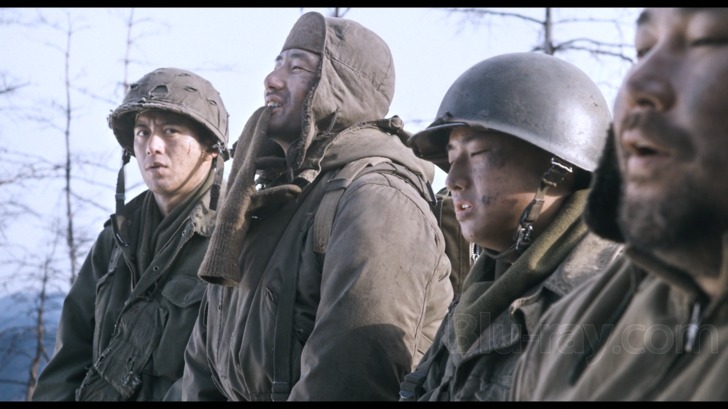
The roiling atmosphere of the Korean Peninsula is still in the news, as evidenced by the recent ascension of Kim Jong-un to the position of Supreme Leader after the death of his father Kim Jong-il, close to sixty years after the supposed cessation of hostilities between the two Koreas. This microcosm of the long simmering Cold War conflict between Communism and Capitalism has come to also define the very notion of a political “hot spot” in a supposedly post- Cold War universe. Despite the prevalence of Korea in the headlines, few people really seem to have a firm grasp on Korea’s long history, or upon any really salient characteristics of the Korean War itself, other than the very broadest of outlines (things like Inchon or General Douglas Macarthur’s famous pronouncements and problems with President Truman). That may make some aspects of The Front Line a bit hard to follow, especially as the film has a somewhat convoluted timeline early in its structure which really isn’t adequately clarified and which may prove to be at least a temporary stumbling block, at least until the main arc of the storyline kicks in.
The Front Line plays out in the waning days of the Korean conflict, as long labored negotiations attempt to bring hostilities to an end and define a mutually agreed upon border between the north and south (something very similar would happen two decades later with an equally protracted negotiation process in Vietnam). One particularly advantageous and strategically important point in the Aerok Hills keeps changing hands, so often in fact that the American negotiator at the “peace talks” table doesn’t even know in whose hands the hill is as he attempts to draw a boundary across the Korean Peninsula. Everyone’s frustration, including both camps of Koreans, is well on display here, leading to some impolitic words by a Lieutenant Kang (Shin Ha-kyun) who’s in attendance. His “loose lips” lead to an immediate transfer to the Eastern Front, the last real vestige of fierce fighting, where he is sent to investigate the killing of a South Korean commander, evidently by one of his own troops, a killing that has been the subject of a surreptitious letter sent by a North Korean “mole” who’s evidently infiltrated the so-called Alligator Company.
One might think from that set up that the film was going to be a procedural where Kang would infiltrate the battalion and try to uncover who the spy was and how the former commander came to be killed, but that really isn’t the case. After a potentially confusing brief flashback which quickly details Kang’s relationship with another soldier, Soo-hyuk (Ko Soo), whom Kang has long thought to be dead, the film moves to its exploration of Alligator Company, where Kang is surprised not just to find Soo-hyuk alive, but thriving in his own peculiar way in the rigors of war. The two friends reignite their comradeship as Kang is horrified by the general state of the troops in Alligator Company: the “grunts” have taken to wearing North Korean uniforms since they are warmer than the South Korean ones, and the new unit commander is addicted to morphine. And as news of a potential cease fire spreads, it becomes all the more important that this chaotic Alligator Company somehow unites to take the all important Aerok Hills before hostilities end.
The main part of The Front Line parlays a dual track, one which reveals the coping mechanisms of members of Alligator Company with a strange sort of détente the South Korean troops have reached with their North Korean counterparts in the same region. Though the two sides continue to fight, they also share their booty with each via a buried stash of treasures which they both frequent to procure things like cigarettes. While it can’t be denied that many of the characters in The Front Line are cliché ridden stereotypes that are cardboard cutouts of similarly skewed men from countless other films, the interaction between the troops, and between the North and South Koreans in particular, give this film a decidedly philosophical and often quite visceral edge. The Front Line is rather well balanced between epic battle scenes and intimate private moments that may have one of the oldest messages on Earth—namely that War is Hell—but which doesn’t make the message any less impactful.
The Front Line is perhaps slightly overlong at a little over two hours, and it devolves into some needless melodrama in its closing act (including a revelation about a North Korean sniper nicknamed Two Seconds that is played for shock value but really isn't all that amazing) that partially undercuts the searing realism that has characterized the bulk of what has gone before. But it’s a bracing experience to finally visit a “forgotten” war from the perspective of the nation that actually was at the center of it all.
The Front Line Blu-ray Movie, Video Quality 
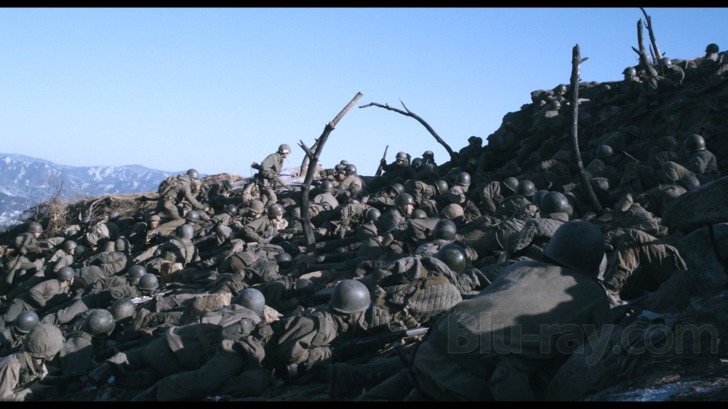
The Front Line is presented on Blu-ray courtesy of Well Go USA with an AVC encoded 1080p transfer in 1.85:1. This Red One shot feature bristles with excellent fine detail and benefits from some fantastic exterior location work which offers incredible depth of field and good, if often quite subdued, color. The film has been tweaked in post, as is so often the case, with some subtle filtering, giving some of the battle scenes a kind of gray-brown ambience, but little if any fine detail is lost despite this tendency. Several interior scenes seems to have been shot with natural lighting, but again there's no lack of shadow detail, and contrast and black levels remain strong and satisfying throughout the feature.
The Front Line Blu-ray Movie, Audio Quality 
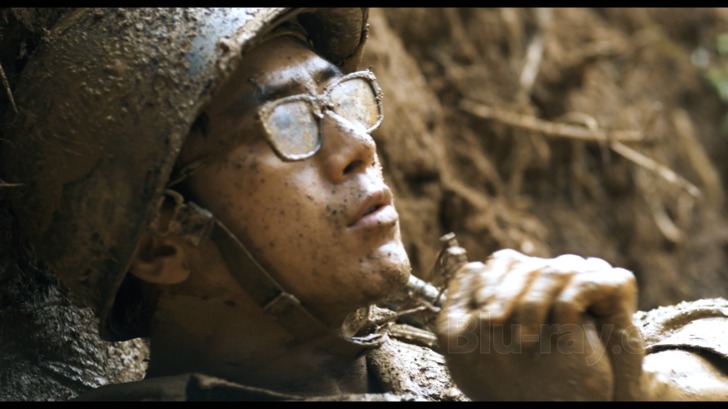
The Front Line's lossless DTS-HD Master Audio 5.1 audio (in the original Korean language) is a solid affair which
expertly balances huge, bombastic battle sequences with quieter dialogue moments. Immersion is spectacularly effective in
the battle scenes, and even in some of the quieter moments, extremely subtle but well placed ambient environmental
noises help to create a very real seeming sound field. Dynamic range is incredibly wide throughout the film, as might be
expected, and there's no dearth of floorboard rattling LFE in several key fight segments. Fidelity is top notch on this track
and overall audiophiles should be extremely pleased not only with the consistently inviting surround activity, but with the
generally nuanced approach to even the more laid back dialogue elements.
For the record, the Blu-ray also offers a standard Dolby Digital 2.0 mix of the original Korean language track.
The Front Line Blu-ray Movie, Special Features and Extras 
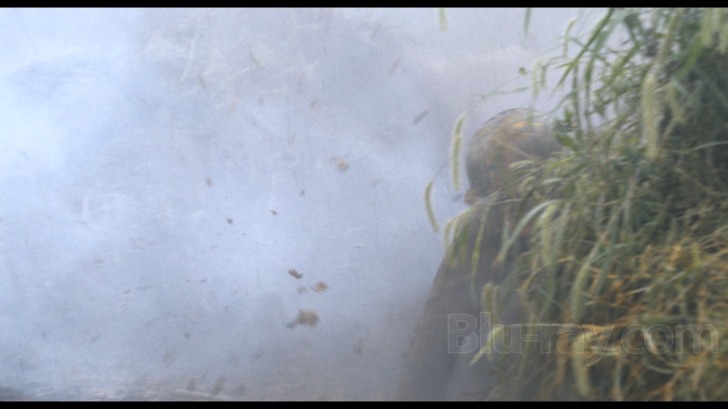
- Original Trailer (SD; 2:08)
- U.S. Trailer (HD; 1:51)
- Making Of (SD; 3:42) is a brief piece that features snippets of interviews with various cast and crew along with equally short snippets from the film and moments of scenes being shot.
- Highlights (SD; 21:45) is like that old (frankly odd) supplement that was included on several of the first Blu-rays that seeks to show off great moments of video and audio. The fact that this is in SD with a Dolby mix kind of undercuts that approach.
The Front Line Blu-ray Movie, Overall Score and Recommendation 
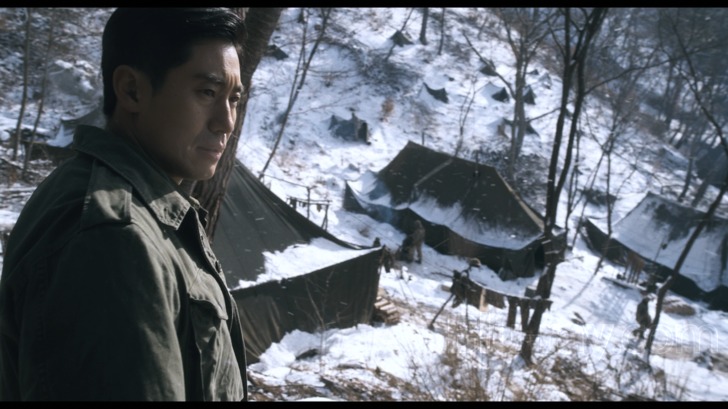
The Front Line was South Korea's entry into the Academy Awards for Best Foreign Language Film, and while it didn't make the short list of eventual nominees, it's a remarkably well crafted film that manages to overcome some of its stereotypical characters to offer a bracing portrait of the chaotic closing days of the Korean War. Expertly directed by Hun Jang, the film is artfully balanced between epochal battle segments and a rather well articulated examination of the interrelationships between a gaggle of characters who are each trying to come to terms with their place in an epic conflict. Though this Well Go USA release is lacking the Bey Logan commentary that graced the U.K. edition, it still boasts incredible video and (especially) audio, and comes Recommended.
Similar titles
Similar titles you might also like

My Way
마이웨이 / Mai Wei
2011

Operation Red Sea
红海行动 / Hong hai xing dong
2018

War of the Arrows
Choi-jong-byeong-gi Hwal
2011

City of Life and Death
南京!南京! / Nanjing! Nanjing!
2009

Stalingrad
1993

The Admiral: Roaring Currents
Myeong-ryang
2014

Fires on the Plain 4K
野火 / Nobi
1959

Lebanon
2009

Monos
2019

White Vengeance
鴻門宴
2011

Battle of the Warriors
墨攻 / Battle of Wits / Battle of Kingdoms
2006

Aquarius
2016

The Bridge
Die Brücke
1959

Assembly
Jí Jié Hào
2007

The Eight Hundred
八佰 / Ba bai
2020

9th Company
9 rota | Collector's Edition
2005

The Rocket
2013

Shame
Skammen
1968

Cross of Iron
1977

Ivan's Childhood
Ива́ново де́тство / Ivanovo detstvo
1962
